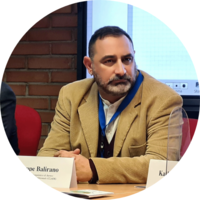
Giuseppe Balirano, PhD in English Linguistics, is Professor of English Linguistics and Translation at the University of Naples L’Orientale, where he is also the current Director of the University Language Centre (CLAOR) and Rector’s Delegate for Lifelong Learning, E-learning and Multimedia Enhancement. He is the President of the Italian Association for the Study of English (AIA). He is also the Director of the monitoring group on hate speech online at the University of Naples L’Orientale and Principal Investigator (PI) of the PRIN 2022 Project admitted for national funding titled “ECHOES. English studies to Contrast Hate Online and Enhance Solidarity”. He is the BeTwiXt series director, publishing original monographs in the field of linguistics and communication studies. His research interests and publications lie in the fields of multimodal critical discourse studies, humour, masculinity and queer studies, the discursive representation of organised crime and audio-visual translation. His most recent publications include: The Rainbow Conspiracy: A Corpus-Based Social Media Analysis of Anti-LGBTIQ+ Rhetoric in Digital Landscapes (2023, with B. Hughes); Re-Defining Gender, Sexuality, and Discourse in the Global Rise of Right-Wing Extremism (2021, co-edited with R. Borba); Homing in on Hate: Critical Discourse Studies of Hate Speech, Discrimination and Inequality in the Digital Age (2020, co-edited with B. Hughes); Food Across Cultures: Linguistic Insights in Transcultural Tastes (2019, co-edited with S. Guzzo); Queering Masculinities in Language and Culture (2018, co-edited with P. Baker); Gardaí & Badfellas: The Discursive Construction of Organised Crime in the Irish Media (2017); Humosexually Speaking: Laughter and the Intersections of Gender (2016, co-edited with D. Chiaro); Languaging Diversity (2015, co-edited with M.C. Nisco); and Masculinity and Representation: A Multimodal Critical Approach to Male Identity Constructions (2014).

Delia Chiaro’s academic career has spanned over forty years, in half of which she has held the position of Professor of English Language and Translation at the University of Bologna’s prestigious Department of Interpreting and Translation.
Delia was part of the first group of scholars in Europe, led by the late Rosa Maria Bollettieri Bosinelli in the mid-1990s, to begin carrying out research within the field of audio-visual translation. Since then, she has run three EU funded summer schools on the subject involving experts and students from seven European institutions – Belgium, France, Germany, Spain, Portugal, Scotland and England as well as directing a successful master’s program on Screen Translation. She has organised dozens of conferences, is author of numerous books and over 100 articles and book chapters, She has been invited speaker at conferences and universities all over the world and has, in fact just returned from a series of conferences in Australia. In 2014, she presented her work on dubbing as a Keynote speaker at the European Commission in both Brussels and Luxembourg as part of "Library Days" events aimed to celebrate the semester of Italian Presidency of the EU. Internationally, she is best known for her work on humour for which he has been interviewed by the BBC, The Economist, RISS (Radio Svizzera), Radio Sydney and the journal Mind. At present she is a Principal Investigator in two European projects on humour in the public sphere.
Her forthcoming book, entitled Comedy in Political Language: How Politicians Use Humour, will be published by Cambridge University Press later this year and 2025 will see the publication of another book Dishing the Dirt; Food, Language and Laughter co-authored with Debra Aarons, published with Taylor and Francis USA.
Delia has served as President of the International Society of Humor Studies (2016-17), an Editorial Board member for HUMOR: International Journal of Humor Research and an Affiliated Researcher with the Centre for Comedy Studies Research, Brunel University UK (CCSR).
Beyond academia, her hobbies include knitting, making cakes, socialising and socialism.

Jorge Díaz Cintas is Professor of Translation and founding director (2013-2016) of the Centre for Translation Studies (CenTraS) at University College London. He is the author of numerous articles, special issues and books on audiovisual translation, including Subtitling: Concepts and Practices (with Aline Remael, 2021). Jorge is a frequent speaker at international conferences and events, and has offered consultant services to the European Parliament, European Commission, NATO, OOONA, Deluxe and Netflix, among others. He is the Chief Editor of the series New Trends in Translation Studies and the recipient of the Jan Ivarsson Award (ESIST, 2014) and the Xènia Martínez Award (ATRAE, 2015) for invaluable services to the field of audiovisual translation.

David Katan is professor of English and Translation at the University of Salento (Lecce), specializing in intercultural communication, transcreation in AVT and tourism translation. Publications include Translating Cultures (3rd edition with Mustapha Taibi), contributions for the Routledge Encyclopaedias of Translation, Translation and Conflict, and Translation and Globalisation; the Benjamins Handbook of Translation Studies and for the Wiley-Blackwell Encyclopedia of Applied Linguistics, and recently co-authored a volume on "The Human Translator" (2023) for Routledge. He is editor-in-chief of Cultus: the Journal for Intercultural Mediation and Communication.
He has been keynote speaker for a variety of international conferences in Italy, Australia, Columbia, The Netherlands, Iraq and South Africa; and is currently Visiting Researcher at the University of South Africa.

Irene Ranzato holds a PhD in Translation Studies from Imperial College London and is associate professor of English language and translation at Sapienza University of Rome (Italy). She is Honorary Research Associate at University College London. Her research interests focus on audiovisual and intersemiotic translation, on the dialectal and social varieties of English and on the intersections between language and ideologies in the analysis of fictional dialogue. Among her publications: the books Translating Culture Specific References - The Case of Dubbing (Routledge, 2016) and Queen’s English?: Gli accenti dell’Inghilterra (Bulzoni, 2017). She co-edited Linguistic and Cultural Representation in Audiovisual Translation (Routledge 2018), Reassessing Dubbing: Historical Approaches and Current Trends (Benjamins, 2019) and The Dialects of British English in Fictional Texts (Routledge 2021) as well as edited collections for the journals Perspectives, Altre Modernità and Cultus. She is the vice-coordinator of the PhD course in Studies in English Literatures, Language and Translation at Sapienza and is currently co-editing English Classics in Audiovisual Translation for Routledge and The Palgrave Handbook of Multilingualism and Language Varieties on Screen.